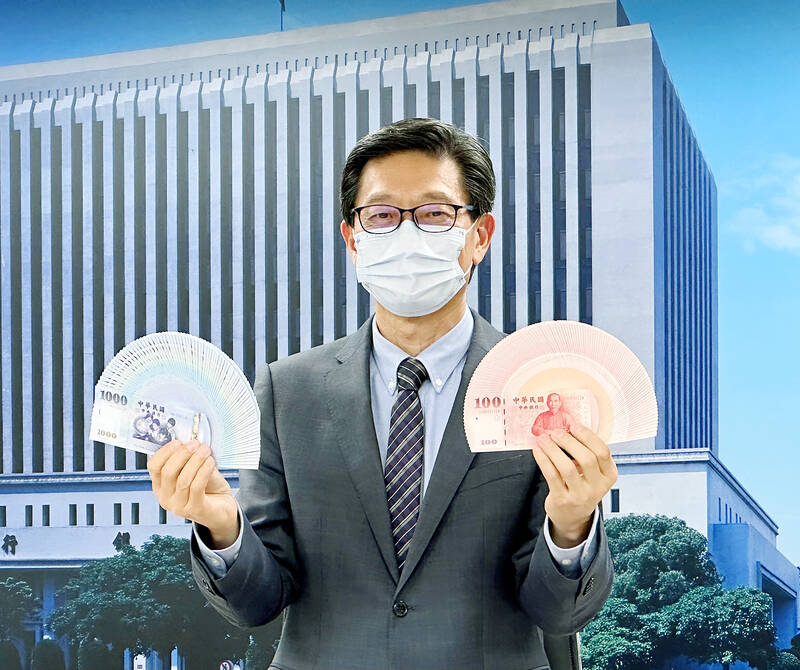Taiwan’s foreign exchange reserves last month increased by US$2.73 billion to a record US$55.93 billion on the back of value gains of major reserve currencies against the US dollar, the central bank said yesterday.
The reserves expanded for a third straight month despite a continued foreign capital outflow of US$3 billion, about consistent with net-sold positions of NT$80 billion (US$2.61 billion) by foreign institutional investors, central bank Department of Foreign Exchange Director-General Eugene Tsai (蔡炯民) told an online news conference.
“The local currency market was relatively quiet last month due probably to Christmas celebrations in the West,” Tsai said, adding that the central bank intervened moderately.

Photo: Chen Mei-ying, Taipei Times
The New Taiwan dollar rose a mild 0.49 percent versus the greenback, he said.
The US dollar index softened 2.29 percent last month as global markets expected a slowdown in the pace of monetary tightening by the US Federal Reserve.
The Fed last month raised interest rates 0.5 percentage points to tame inflation, after two 0.75 percentage point hikes in its previous adjustments.
The yen picked up 4.59 percent after the Bank of Japan late last month announced it was adjusting its stance on bond purchases, fueling expectations of changes in its easy monetary policy.
The euro gained 3.01 percent against the US dollar, while the yuan picked up 2.43 percent, Tsai said.
For the whole of last year, Taiwan’s foreign exchange reserves expanded by US$6.52 billion, the smallest increase since 2015, Tsai said.
The central bank said at a separate news conference in Taipei that if the government is to distribute NT$6,000 in cash to every Taiwanese after the Lunar New Year holiday to stimulate the economy, as announced on Wednesday, there is no need to print additional banknotes.
The central bank usually sees the return of NT$300 billion in cash after the holiday, it said.
Demand for cash would peak on the eve of the holiday starting on Jan. 20, the central bank said.

CHIP WAR: Tariffs on Taiwanese chips would prompt companies to move their factories, but not necessarily to the US, unleashing a ‘global cross-sector tariff war’ US President Donald Trump would “shoot himself in the foot” if he follows through on his recent pledge to impose higher tariffs on Taiwanese and other foreign semiconductors entering the US, analysts said. Trump’s plans to raise tariffs on chips manufactured in Taiwan to as high as 100 percent would backfire, macroeconomist Henry Wu (吳嘉隆) said. He would “shoot himself in the foot,” Wu said on Saturday, as such economic measures would lead Taiwanese chip suppliers to pass on additional costs to their US clients and consumers, and ultimately cause another wave of inflation. Trump has claimed that Taiwan took up to

A start-up in Mexico is trying to help get a handle on one coastal city’s plastic waste problem by converting it into gasoline, diesel and other fuels. With less than 10 percent of the world’s plastics being recycled, Petgas’ idea is that rather than letting discarded plastic become waste, it can become productive again as fuel. Petgas developed a machine in the port city of Boca del Rio that uses pyrolysis, a thermodynamic process that heats plastics in the absence of oxygen, breaking it down to produce gasoline, diesel, kerosene, paraffin and coke. Petgas chief technology officer Carlos Parraguirre Diaz said that in

SUPPORT: The government said it would help firms deal with supply disruptions, after Trump signed orders imposing tariffs of 25 percent on imports from Canada and Mexico The government pledged to help companies with operations in Mexico, such as iPhone assembler Hon Hai Precision Industry Co (鴻海精密), also known as Foxconn Technology Group (富士康科技集團), shift production lines and investment if needed to deal with higher US tariffs. The Ministry of Economic Affairs yesterday announced measures to help local firms cope with the US tariff increases on Canada, Mexico, China and other potential areas. The ministry said that it would establish an investment and trade service center in the US to help Taiwanese firms assess the investment environment in different US states, plan supply chain relocation strategies and

Japan intends to closely monitor the impact on its currency of US President Donald Trump’s new tariffs and is worried about the international fallout from the trade imposts, Japanese Minister of Finance Katsunobu Kato said. “We need to carefully see how the exchange rate and other factors will be affected and what form US monetary policy will take in the future,” Kato said yesterday in an interview with Fuji Television. Japan is very concerned about how the tariffs might impact the global economy, he added. Kato spoke as nations and firms brace for potential repercussions after Trump unleashed the first salvo of